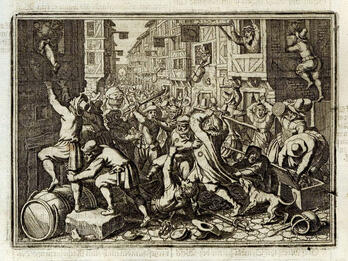Divre ha-yamim shel ha-apifyor Paulo revi‘i (The History of Pope Paul IV)
On the 4th of Sivan 5315 [June 3, 1555], after the death of Pope Marcellus [of] La Marche, whose name will be well remembered, though he reigned only twenty-three days, he gave great redemption to Israel—when the new Pope was raised to the papal throne in Rome, he was named Paul IV, may his name and memory be blotted out. From the beginning of his reign he planned to humiliate our nation, and he did so successfully, for our many sins, trampling the remnant of Israel beneath his feet, those in exile under his rule, for the Lord examined their many sins and turned His heart to hate His people, because their heart was haughty in the Exile, and they trusted their wealth, as they sat in security in chambers of delights and their courts and palaces, this one going to his vineyard and that one going to his field, with their silver and gold with them, and they did not remember the Lord nor did they set aside time for the Torah. They ignored the Torah because of wealth, and the Lord raised His staff of punishment against them and chastised them. A new king arose, to renew various decrees against them.
And this is what they began to do: he issued a written decree, called a bulla, against the Jews. Inscribed in it are thirteen restrictions, which most of the community cannot withstand. We wished to write it for a memorial, so that the last generation and people of distant lands will know what happened to us in the time of Paul IV. And these are they:
- That in a city there should neither be seen nor found more than one synagogue for Jews to pray in, and in every city where there were many synagogues, they should be ruined and destroyed, and only one should be left.
- That the [men] should be required to place a green hat on their heads, and the females should wear a green turban, while sitting in their homes, while walking in the streets, and while lying down.
- That Jewish dwellings should be in one or two areas, so that they should not be able to live dispersed among the gentiles.
- That a Jew should not own land or buildings, and that every one of them who had a house or a field or a vineyard should be required to sell it before four months have passed.
- That it should be forbidden for Jews to deal in selling wheat and barley, wine and oil, and any foodstuffs to be sold to gentiles, and that no business should be permitted to them except strazzariae seu cenciariae [worn-out clothes], and
- That they should not be permitted to hire a gentile servant or maidservant.
- That Hebrew infants should not nurse from the milk of gentile wet-nurses.
- That Jewish physicians should be forbidden to treat gentiles, either for a fee or gratis.
- That Hebrews should not eat bread with gentiles, and that they should not laugh with them at any entertainment, nor should they form any partnership with a gentile, and that they should not have with them any kind of mutual guarantee, which is known in their language as conversazione.
- That they should not agree that honorable Jews should be called by the title of messere by the gentiles, and not by any title of rabbinate or lordship or mastery or any elevated name in any place, not even in the synagogue.
- That lenders for interest should take 12 percent and no more on account for an entire year, and that all the months should be full, with respect to interest, of thirty days per month, and that all dwellings of the gentiles that are mortgaged to Jews would be required to be sold at auction, and the remainder to be given to the owner.
- That the Jews should be forbidden to work on their holidays.
- And this is the harshest of all: that from that day of enactment onward all the conditions and privileges that [the Jews] had obtained earlier for their rights among the gentiles were rescinded, and the Jews would be subject to the laws of each and every city and all the regulations that might be passed against them, and the punishment for disobeying any of these regulations would be corporal punishment and to be divested of all property, like someone worthy of the punishment against rebels against the kingdom.
These are the thirteen decrees of the bulla, harsh and evil decrees that were passed against them at the start of the reign of Paul IV, the Jews accepted and obeyed them against their will, and not to their benefit, and anyone who disobeyed one of them was subject to monetary and physical punishments.
Translated by
.
Credits
Benjamin Nehemiah ben Elnatan, “A Hebrew Chronicle from the 16th Century,” from Mi-Pa’ulo ha-revi ad Piyus ha-hamishi [Paul IV to Pius V], ed. Isaiah Sonne (Jerusalem: Bialik Institute, 1954), pp. 24–28. Used by permission of The Bialik Institute.
Published in: The Posen Library of Jewish Culture and Civilization, vol. 5.



